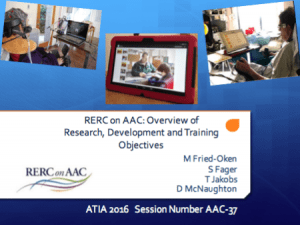 Fried-Oken, M., Fager, S., Jakobs, T., & McNaughton, D. (February, 2016). RERC on AAC: Overview of research, development and training objectives. Presentation at the Annual Conference of the Assistive Technology Industry Association, Orlando, Fl.
Fried-Oken, M., Fager, S., Jakobs, T., & McNaughton, D. (February, 2016). RERC on AAC: Overview of research, development and training objectives. Presentation at the Annual Conference of the Assistive Technology Industry Association, Orlando, Fl.
Handout as pdf
Abstract: The Rehabilitation Engineering Research Center on Augmentative and Alternative Communication (RERC on AAC) is a 5-year collaborative center, recently funded by the National Institute on Disability, Independent Living and Rehabilitation Research. The RERC on AAC is mandated to address research, development, training and dissemination projects as they relate to Rehabilitation Strategies and Interventions for individuals with complex communication needs (CCN).
The RERC on AAC partners will use this forum to present our individual projects and discuss our progress through Year 1. Three critical areas for rehabilitation science and engineering are examined in seven research and development projects. They are:
- Access: Investigation and development of new access techniques (i.e., brain computer interface and multimodal techniques) to achieve more efficient and effective access for individuals with CCN who have severe motor impairments.
- Language support technologies: Investigation and invention of AAC technologies to support language use and communication for individuals with CCN who have significant language, cognitive, and /or motor limitations (i.e., technologies that support the transition to literacy for preliterate individuals with CCN, technologies that provide smart prediction to enhance the accuracy, efficiency and independence of text entry for spontaneous communication, and technologies that incorporate video-based visual scene displays (VSDs) to provide dynamic visual supports for communication for those with significant language /cognitive limitations); and
- Human computer interfaces (HCI): Investigation of techniques to decrease the cognitive processing demands of AAC human computer interfaces and development of tools to improve the person-technology match to enhance communication performance of individuals with CCN. RERC on AAC partners will each present the projects and progress that correspond to the three core areas. The RERC on AAC is building research and development capacity by training undergraduate and graduate students in AAC research methods, product development, and technology transfer through the following activities.
Five active training efforts are underway:
- Mentored research and lab experiences;
- AAC Webcasts & an AAC MOOC (Massive Open Online Course);
- Support for the RESNA Student Design Competition;
- Research Think Tanks where doctoral students and their advisors will convene for a meeting that will stimulate the next generation of AAC research and development in the US and
- an AAC Incubator: The AAC Incubator will identify key technology barriers for individuals with CCN and develop solutions via Rehabilitation Engineering Capstone projects and an AAC hack-a-thon.
RERC on AAC partners will present outcomes of training projects for year 1 of the center. The RERC on AAC is relying on a multi-faceted dissemination approach to reach a wide variety of AAC stakeholders. Dissemination projects that are ongoing include: RERC on AAC Website; Webcasts & YouTube channel; RERC on AAC e-Blast; Conference presentations and archive; Journal publications and archive; Consumer newsletter and blogs; Technical assistance; RERC on AAC booth at major conferences (including ATIA); and a State of the Science Conference in 2018. RERC on AAC partners will present outcomes of dissemination efforts for year 1 of the center, including description of the new website and analytics about its use. Partners of the RERC on AAC will be present throughout the ATIA conference, at posters, presentations and in an Exhibitor’s booth. We are: Janice Light (PI) and David McNaughton from Penn State University; Melanie Fried-Oken from Oregon Health & Science University; Susan Fager and David Beukelman from Madonna Rehabilitation Hospital; and Tom Jakobs from InvoTek Inc. Individuals with CCN inform all projects and efforts of this collaborative center. The importance of Participatory Action Research and an active external advisory board will be stressed throughout every project presentation.
